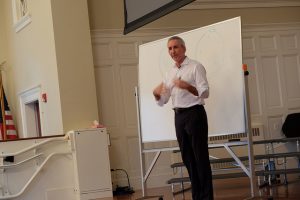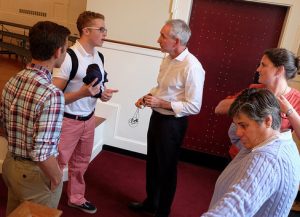
Williston’s first student life speaker to discuss this year’s theme of Emotional Fitness, Garret Kramer, addressed an assembly in the Phillips Stevens Chapel on September 30. Kramer, founder of Inner Sports, has coached athletes and corporate clients, and is the author of two books, Stillpower: Excellence with Ease in Sports and Life, and The Path of No Resistance: Why Overcoming is Simpler than You Think.
His basic thesis is that our minds are sometimes cluttered with thoughts. That’s when we feel insecure and disconnected. At other times, our minds are clear. That’s when we feel confident and can connect with our passions. Both these states are normal, and we move back and forth from what he called state A (the cluttered mind) to state B (the clear mind). Difficulty arises, he posited, when we resist the up and down nature of this cycle, and when we don’t realize that external circumstances don’t cause the back-and-forth. “We work in-to-out, not out-to-in, even though it’s quite normal to think the opposite is true,” he said.
Kramer called this natural ability to self-correct our “psychological immune system.” To illustrate, he described a toddler having a tantrum. This toddler will eventually calm down and move into a clear state of mind. The toddler didn’t “think” his way to this new state of mind. It just happened, and he or she let it happen. “A toddler doesn’t obstruct the psychological immune system.”

Kramer’s talk spurred many questions, and some push-back, from students. One questioned how external circumstances, such as a death in the family, could not affect one’s state of mind. Kramer said there is a correlation between the sadness we feel at someone’s death or any tragedy, but the circumstance doesn’t cause the feeling. Another student asked what Kramer his source for his information. “Truth,” he answered, citing leaders such as Ghandi, Martin Luther King Jr., and Nelson Mandela who have spoken about this phenomenon.
Student Harrison Winrow ’18 appreciated both the talk, and the robust give-and-take between Kramer and the audience. “I was inspired to see how passionate members of the student body and faculty were today, inciting lengthy dialogue and insightful debate all around campus for the hours following assembly,” he said.
Students and faculty will have more opportunities to discuss and think about the theme of Emotional Fitness at upcoming advisory meetings and class assemblies this term.

